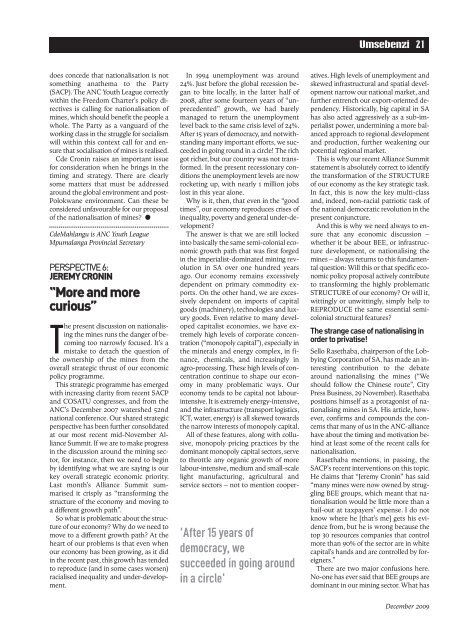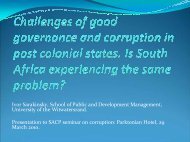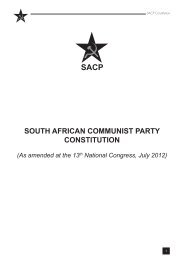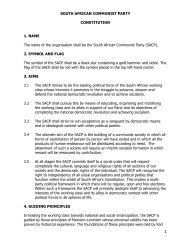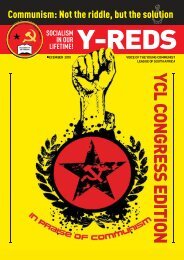Forward to Socialism!! - South African Communist Party
Forward to Socialism!! - South African Communist Party
Forward to Socialism!! - South African Communist Party
Create successful ePaper yourself
Turn your PDF publications into a flip-book with our unique Google optimized e-Paper software.
Umsebenzi 21<br />
does concede that nationalisation is not<br />
something anathema <strong>to</strong> the <strong>Party</strong><br />
(SACP). The ANC Youth League correctly<br />
within the Freedom Charter’s policy directives<br />
is calling for nationalisation of<br />
mines, which should benefit the people a<br />
whole. The <strong>Party</strong> as a vanguard of the<br />
working class in the struggle for socialism<br />
will within this context call for and ensure<br />
that socialisation of mines is realised.<br />
Cde Cronin raises an important issue<br />
for consideration when he brings in the<br />
timing and strategy. There are clearly<br />
some matters that must be addressed<br />
around the global environment and post-<br />
Polokwane environment. Can these be<br />
considered unfavourable for our proposal<br />
of the nationalisation of mines?<br />
CdeMahlangu is ANC Youth League<br />
Mpumalanga Provincial Secretary<br />
PERSPECTIVE 6:<br />
JEREMY CRONIN<br />
“More and more<br />
curious”<br />
The present discussion on nationalising<br />
the mines runs the danger of becoming<br />
<strong>to</strong>o narrowly focused. It’s a<br />
mistake <strong>to</strong> detach the question of<br />
the ownership of the mines from the<br />
overall strategic thrust of our economic<br />
policy programme.<br />
This strategic programme has emerged<br />
with increasing clarity from recent SACP<br />
and COSATU congresses, and from the<br />
ANC’s December 2007 watershed 52nd<br />
national conference. Our shared strategic<br />
perspective has been further consolidated<br />
at our most recent mid-November Alliance<br />
Summit. If we are <strong>to</strong> make progress<br />
in the discussion around the mining sec<strong>to</strong>r,<br />
for instance, then we need <strong>to</strong> begin<br />
by identifying what we are saying is our<br />
key overall strategic economic priority.<br />
Last month’s Alliance Summit summarised<br />
it crisply as “transforming the<br />
structure of the economy and moving <strong>to</strong><br />
a different growth path”.<br />
So what is problematic about the structure<br />
of our economy? Why do we need <strong>to</strong><br />
move <strong>to</strong> a different growth path? At the<br />
heart of our problems is that even when<br />
our economy has been growing, as it did<br />
in the recent past, this growth has tended<br />
<strong>to</strong> reproduce (and in some cases worsen)<br />
racialised inequality and under-development.<br />
'After 15 years of<br />
democracy, we<br />
succeeded in going around<br />
in a circle'<br />
In 1994 unemployment was around<br />
24%. Just before the global recession began<br />
<strong>to</strong> bite locally, in the latter half of<br />
2008, after some fourteen years of “unprecedented”<br />
growth, we had barely<br />
managed <strong>to</strong> return the unemployment<br />
level back <strong>to</strong> the same crisis level of 24%.<br />
After 15 years of democracy, and notwithstanding<br />
many important efforts, we succeeded<br />
in going round in a circle! The rich<br />
got richer, but our country was not transformed.<br />
In the present recessionary conditions<br />
the unemployment levels are now<br />
rocketing up, with nearly 1 million jobs<br />
lost in this year alone.<br />
Why is it, then, that even in the “good<br />
times”, our economy reproduces crises of<br />
inequality, poverty and general under-development?<br />
The answer is that we are still locked<br />
in<strong>to</strong> basically the same semi-colonial economic<br />
growth path that was first forged<br />
in the imperialist-dominated mining revolution<br />
in SA over one hundred years<br />
ago. Our economy remains excessively<br />
dependent on primary commodity exports.<br />
On the other hand, we are excessively<br />
dependent on imports of capital<br />
goods (machinery), technologies and luxury<br />
goods. Even relative <strong>to</strong> many developed<br />
capitalist economies, we have extremely<br />
high levels of corporate concentration<br />
(“monopoly capital”), especially in<br />
the minerals and energy complex, in finance,<br />
chemicals, and increasingly in<br />
agro-processing. These high levels of concentration<br />
continue <strong>to</strong> shape our economy<br />
in many problematic ways. Our<br />
economy tends <strong>to</strong> be capital not labourintensive.<br />
It is extremely energy-intensive,<br />
and the infrastructure (transport logistics,<br />
ICT, water, energy) is all skewed <strong>to</strong>wards<br />
the narrow interests of monopoly capital.<br />
All of these features, along with collusive,<br />
monopoly pricing practices by the<br />
dominant monopoly capital sec<strong>to</strong>rs, serve<br />
<strong>to</strong> throttle any organic growth of more<br />
labour-intensive, medium and small-scale<br />
light manufacturing, agricultural and<br />
service sec<strong>to</strong>rs – not <strong>to</strong> mention cooperatives.<br />
High levels of unemployment and<br />
skewed infrastructural and spatial development<br />
narrow our national market, and<br />
further entrench our export-oriented dependency.<br />
His<strong>to</strong>rically, big capital in SA<br />
has also acted aggressively as a sub-imperialist<br />
power, undermining a more balanced<br />
approach <strong>to</strong> regional development<br />
and production, further weakening our<br />
potential regional market.<br />
This is why our recent Alliance Summit<br />
statement is absolutely correct <strong>to</strong> identify<br />
the transformation of the STRUCTURE<br />
of our economy as the key strategic task.<br />
In fact, this is now the key multi-class<br />
and, indeed, non-racial patriotic task of<br />
the national democratic revolution in the<br />
present conjuncture.<br />
And this is why we need always <strong>to</strong> ensure<br />
that any economic discussion –<br />
whether it be about BEE, or infrastructure<br />
development, or nationalising the<br />
mines – always returns <strong>to</strong> this fundamental<br />
question: Will this or that specific economic<br />
policy proposal actively contribute<br />
<strong>to</strong> transforming the highly problematic<br />
STRUCTURE of our economy? Or will it,<br />
wittingly or unwittingly, simply help <strong>to</strong><br />
REPRODUCE the same essential semicolonial<br />
structural features?<br />
The strange case of nationalising in<br />
order <strong>to</strong> privatise!<br />
Sello Rasethaba, chairperson of the Lobbying<br />
Corporation of SA, has made an interesting<br />
contribution <strong>to</strong> the debate<br />
around nationalising the mines (“We<br />
should follow the Chinese route”, City<br />
Press Business, 29 November). Rasethaba<br />
positions himself as a protagonist of nationalising<br />
mines in SA. His article, however,<br />
confirms and compounds the concerns<br />
that many of us in the ANC-alliance<br />
have about the timing and motivation behind<br />
at least some of the recent calls for<br />
nationalisation.<br />
Rasethaba mentions, in passing, the<br />
SACP’s recent interventions on this <strong>to</strong>pic.<br />
He claims that “Jeremy Cronin” has said<br />
“many mines were now owned by struggling<br />
BEE groups, which meant that nationalisation<br />
would be little more than a<br />
bail-out at taxpayers’ expense. I do not<br />
know where he [that’s me] gets his evidence<br />
from, but he is wrong because the<br />
<strong>to</strong>p 30 resources companies that control<br />
more than 90% of the sec<strong>to</strong>r are in white<br />
capital’s hands and are controlled by foreigners.”<br />
There are two major confusions here.<br />
No-one has ever said that BEE groups are<br />
dominant in our mining sec<strong>to</strong>r. What has<br />
December 2009


